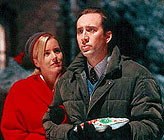|
|
|
|
The
Family Man
|
 |
|
In an odd way, the premise of the saccharine romantic drama The Family Man exactly inverts that of the Bedazzled remake (2000). In the Faustian comedy of Bedazzled, an ordinary guy, downtrodden in his banal existence, is offered a fabulous, alternative life by the Devil. At the start of The Family Man, Jack (Nicolas Cage) is already enjoying the high life about which the hero of Bedazzled can only dream. He is a wildly successful, workaholic, corporate type, with a swish apartment and beautiful women at his beck and call. However, a chance meeting with a gun-toting bum, Cash (Don Cheadle), shifts Jack into the past he once refused – a lower middle-class home in the suburbs with Kate (Tea Leoni). This film is so dreary that one can only alleviate the boredom by enumerating such comparisons with other movies. Like Rachel Griffiths in Me Myself I (1999), Jack gets to confront for the first time such daily, mundane horrors as nappy changing, predatory neighbours and extended family barbecues. Like Harrison Ford in Regarding Henry (1991), he discovers a new, better self far from the cold corridors of capitalist power. Like Gwyneth Paltrow in Sliding Doors (1998), he gets to experience the romance-that-could-have-been. Of course, The Family Man strives above all to be a modern version of Frank Capra's classic It's a Wonderful Life (1946) – with Cash functioning as the guardian angel who can be summoned by the tinkling of a bell. However supernatural this set-up, the film is utterly devoid of spiritual or religious themes. Nor does it really face up to the central challenge laid down by Capra: if you are going to make a film extolling the joys of an average life, you had better make it seem like an extremely attractive option. There are at least three problems facing The Family Man on this score. The first is the casting of Cage – a sombre, intensely histrionic performer who is right for Bringing Out the Dead (1999) but almost always wrong as the lead in comedies and romances, except when he can be suitably grotesque (as in Moonstruck, 1987). The second problem is that the filmmakers have so little time for what constitutes everyday family life – especially kids. Jack's "I have seen the light" speeches late in the film about the wonders of raising children come virtually out of nowhere. The same unbelievability hangs over the depiction of his boorish, supposedly salt-of-the-earth bowling buddies. The third and most glaring problem is the decor. Production designer Kristi Zea, who had such fun with the gangster homes in Goodfellas (1990), again has a ball recreating these garish eyesores of suburban interiors. But the superior laughter, shared by director Brett Ratner, completely betrays what the film is meant to be saying. While it huffs and puffs about love, sacrifice, struggle and choices, The Family Man is truly interested in only one thing: that great contemporary cultural obsession known as lifestyle. By the time Jack has started fondly stroking bricks the way that James Stewart kissed his stairway in It's a Wonderful Life, we are far from being convinced by his idiotic gesture. No matter what the film asserts, its own cold heart is still back in those gleaming boardrooms, limousines and luxury apartments. MORE Ratner: Red Dragon, Rush Hour © Adrian Martin January 2001 |
![]()